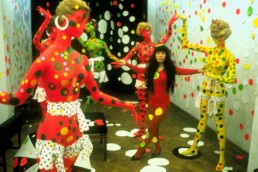‘Kusama: Infinity’ Review: Psychosomatic Polka Dot Princess
This is a custom heading element.
If you visited The Broad in downtown L.A. anytime between now and 2015 or saw your Instagram flooded with pictures of mind-blowing selfies in its Infinity Mirror room exhibit, then you’ve been exposed to Japanese artist Yayoi Kusama’s work.
Known for her simplistic, yet avant-garde polka dot patterns, sculptures, and mirror play, the enigma that is Yayoi Kusama is explored in the documentary Kusama: Infinity. This arthouse film, which premiered at the Sundance Film Festival this year, is a wealth of knowledge packaged into a swift 77 minutes and is guaranteed to satisfy fans while piquing the curiosity of those who may have been previously unfamiliar with her work.
The film covers Yayoi’s turbulent upbringing in Matsumoto City, Japan during World War II. In addition to the country’s political turmoil and conservative view of the arts, Yayoi struggled to find acceptance within her community, with no help from her nonsupportive parents. Knowing that she was destined for worldwide greatness, she moved to New York City and began showcasing her work in small galleries and exhibitions. Eventually, her work caught the attention of the art world (rivaling Andy Warhol’s fame) and she quickly began to make a name for herself. Currently, at 89 years-old, Yayoi Kusama is the top-selling female artist in the world.
Currently, at 89 years-old, Yayoi Kusama is the top-selling female artist in the world.
Of course, her story isn’t without emotional pitfalls and unlucky streaks. The film’s director, Heather Lenz, is sensitive to Yayoi’s struggles and mental health issues when revealing her low points, including a failed suicide attempt and the fact that she started traveling with a psychiatrist in order to prevent panic attacks. The interviews that Lenz conducts with Yayoi, as well as top-notch curators from the Guggenheim, Tate Modern, and other notable galleries, give the audience an intimate look at this female Japanese outsider in the Western art world, whose work was surrounded by scandal and notoriety.
Yayoi Kusama is still alive today, living in a mental institution in Japan and continues to work and create. She never married or had children, thus, her legacy remains with her work. This doesn’t seem to bother her, though, as she exclaims in the last line of the film, “I want to live forever.” There is no question that Yayoi will be remembered forever as far more than just an artist. She is a visionary, underdog, feminist, and international icon.
‘Kusama: Infinity’ is not rated. 77 minutes. Opening this Friday at the Nuart Theatre.
Morgan Rojas
Certified fresh. For disclosure purposes, Morgan currently runs PR at PRETTYBIRD and Ventureland.


